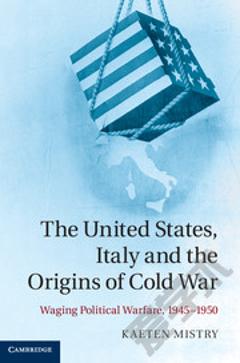The United States, Italy and the Origins of Cold War: Waging Political Warfare, 1945–1950
This international history of the origins and nature of 'cold war' offers the first systematic examination of the complex relationship between the United States and Italy, and of American debates about warfare in the years between World War II and the Korean War. Kaeten Mistry reveals how the defeat of the Marxist left in the 1948 Italian election was perceived as a victory for the United States amidst a 'war short of war', as defined by influential planner George Kennan, becoming an allegory for cold war in American minds. The book analyses how political warfare sought to employ covert operations, overt tactics and propaganda in a co-ordinated offensive against international communism. Charting the critical contribution of a broad network of local, religious, civic, labour, and business groups, Mistry reveals how the notion of a specific American success paved the way for a problematic future for US-Italian relations and American political warfare.
{{comment.content}}








 京公网安备 11010802027623号
京公网安备 11010802027623号